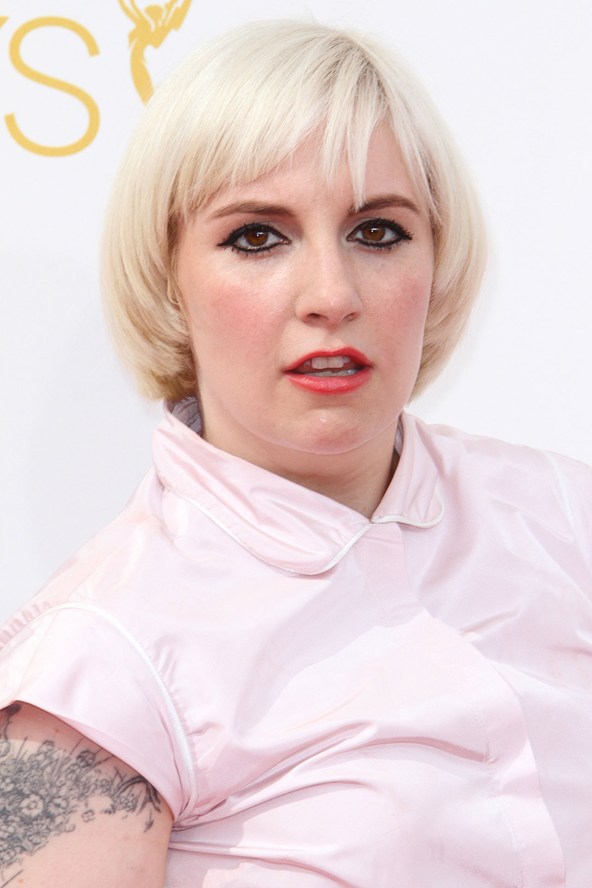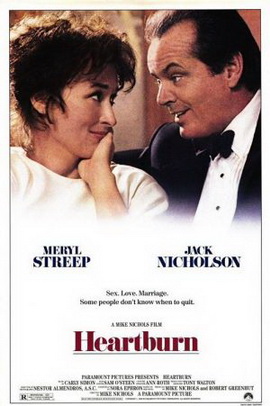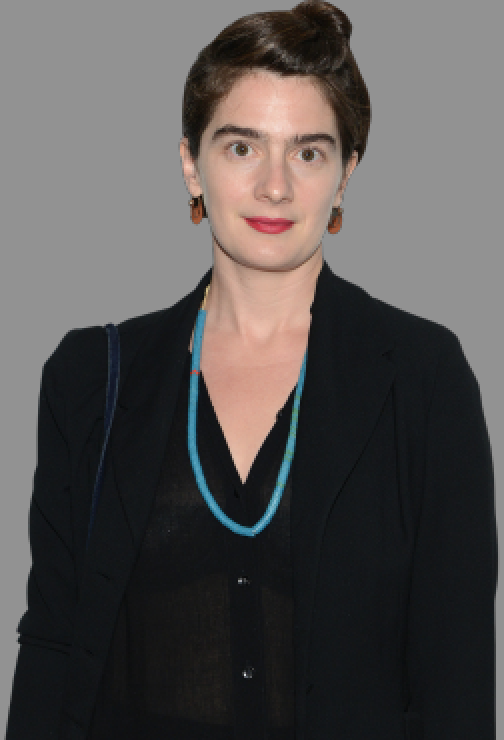 Unlike many of her peers, Lena Dunham doesn’t score buzz for celebrity feuds, leaked sex tapes, or alleged stints in rehab. Instead, the Oberlin-educated actress, producer, director, and writer is known for clever quips, unapologetic feminism, a signature style, her film and TV projects (most recently, she’s producing a documentary about a tailoring company for the LGBT community), and an endearing, brilliantly articulated honesty. In short, she’s the latest in a long line of great Hollywood dames. So it’s no surprise that Lady Dunham has plenty of mentors – from Judd Apatow to her mom, the artist Laurie Simmons, to the late Nora Ephron. In fact, when the writer and director died in 2012, Dunham’s New Yorker remembrance (Nora’s advice about her love problems: “You can’t meet someone until you’ve become what you’re becoming”) was so loving and clear that it launched her own career as an author. To celebrate the publication of her memoir cum Helen Gurley-inspired advice manual Not That Kind of Girl, then, let’s consider a fantasy Dunham remake of “Heartburn,” the 1986 adaptation of Ephron’s thinly disguised account of her divorce from Watergate journalist Carl Bernstein.
Unlike many of her peers, Lena Dunham doesn’t score buzz for celebrity feuds, leaked sex tapes, or alleged stints in rehab. Instead, the Oberlin-educated actress, producer, director, and writer is known for clever quips, unapologetic feminism, a signature style, her film and TV projects (most recently, she’s producing a documentary about a tailoring company for the LGBT community), and an endearing, brilliantly articulated honesty. In short, she’s the latest in a long line of great Hollywood dames. So it’s no surprise that Lady Dunham has plenty of mentors – from Judd Apatow to her mom, the artist Laurie Simmons, to the late Nora Ephron. In fact, when the writer and director died in 2012, Dunham’s New Yorker remembrance (Nora’s advice about her love problems: “You can’t meet someone until you’ve become what you’re becoming”) was so loving and clear that it launched her own career as an author. To celebrate the publication of her memoir cum Helen Gurley-inspired advice manual Not That Kind of Girl, then, let’s consider a fantasy Dunham remake of “Heartburn,” the 1986 adaptation of Ephron’s thinly disguised account of her divorce from Watergate journalist Carl Bernstein.
Though that film boasted a terrific premise and an astonishing pedigree – Ephron herself wrote the screenplay; Oscar-winning Mike Nichols directed; Oscar-winning Meryl Streep starred as food writer Rachel (the Ephron stand-in); Oscar-winning Jack Nicholson played columnist Mark (the Bernstein stand-in); Carly Simon sang the soundtrack; and the supporting cast included Jeff Daniels, Stockard Channing, Catherine O’Hara, Oscar-winning Kevin Spacey (who plays a subway mugger in one of his first-ever screen roles), and Oscar-winning Milos Forman – it was a mixed bag at best. The problem lay mostly with Nichols. With respect to his legendary wit (check out his early standup with writer Elaine May), it didn’t quite match the sensibilities of good-girl absurdist Nora. On the other hand, Dunham’s combination of excellent manners and wacky irreverence – not to mention her family background of well-off creatives – mirrors Ephron perfectly.
Granted, as much as the young writer respected Ephron, she’d never preserve the unconscious classism and racism running through the latter’s book and screenplay. (Her characterization of a Latin American maid as dumb-witted and grasping is downright hateful, for example.) Nor would Dunham cleave closely to the 1986 screenplay. But that’s why the “Girls” showrunner should draw on her triple-threat skills to really shape the material herself – not only co-producing with Judd Apatow and her longtime partner Jenni Konner but re-adapting the screenplay and, of course, directing.
Consider the possibilities. Up until now, Dunham’s film and TV work has focused on twentysomethings struggling to find their way financially, romantically, and even domestically. It’s high time she tackled material that reflected her real-life experiences as a hyper-accomplished hyphenate with a beautifully appointed home and a live-in beau (indie rock star Jack Antonoff, who’s described their relationship as that of an “old married couple”). Ephron’s tale of marriage, parenting, and real estate in a Washington, D.C., community of wheeling-and-dealing politicos and writers would provide ideal fodder – especially since it’s set in the late 1970s, an era that Dunham adores. (Witness her love for the 1978 avant-garde feminist cult classic “Girlfriends.”) And edgy Dunham’s screenplay would surely outstrip her mentor’s: As a screenwriter (and director), Ephron was far more middle-of-the road than she was as an author.
Not only would the style-forward Lena achieve era-fabulous set design and fashion – just imagine the aviators and geometric prints everyone would sport – but she’d capture the women’s liberationist angst jostling against everyone’s wedding-cake dreams. And speaking of wedding cake, who better than the nation’s most unabashed dessert-lover to replicate the recipes peopling Ephron’s book? I actually can’t believe Lena hasn’t tried her hand at a food porn, er, film yet.
Casting this picture would be a breeze since genial Dunham has built an amazing network of actors and filmmakers. Start with Gaby Hoffman as Rachel. The former child star is in the midst of a well-deserved renaissance, she works wells with Lena (remember her screamingly funny turn in “Girls?”), and her deadpan, lickety-split style is not only Totally 1970s but Totally Nora. (Bonus: she appeared in two Ephron films.) I’d also draw from the Dunham Players to cast Mark: live-wire Adam Driver, who plays Lena’s beau on “Girls,” is one of the few under-forty actors working today who could achieve the character’s essential balance of charming and weasley. As for Thelma, the too-tall, too-polished politico with whom Mark has an affair, it should so clearly be tall, polished Katherine Heigl. Despite her bad rep, I’ve always gotten the sense Heigl’s a funny feminist who just never learned to strategically play the publicity game. Lena likes to turn things around for people, and this would be a great opportunity for Heigl to reestablish her reputation and mend fences with Apatow, whom she alienated during the making of “Knocked-Up.” (If Heigl weren’t amenable, Dunham mentee Taylor Swift is also quite tall and polished.)
 The oh-so-wonderful Brie Larson could play Julie, Rachel’s sharp, sympathetic best friend, and Chris Pratt might be a natural as Julie’s pie-faced, pie-loving husband Arthur. The rest of Mark and Rachel’s social circle could be rounded out by the likes of versatile “Girls” star Zosia Mamet, the underrated John Gallagher Jr., and Dunham mentors Mindy Kaling and Tina Fey (obviously). As for the Debbie Downers peopling Rachel’s NYC therapy group (talk about 1970s!), I’d suggest Lena favorite Alex Karpovsky, grouchy Aubrey Plaza, Michael B. Jordan, and Eddie Huang, if the writer and restauranteur would be willing to moonlight as an actor. After years as a Type A surgeon on “Grey’s Anatomy,” Sandra Oh might have fun as Rachel’s brass-tacks, sexually frank shrink, and I’d love Jeff Goldblum as Rachel’s bipolar comedy writer of a dad. As for the subway mugger, these days Michael Cera seems to do best in just these sorts of small, pivotal roles.
The oh-so-wonderful Brie Larson could play Julie, Rachel’s sharp, sympathetic best friend, and Chris Pratt might be a natural as Julie’s pie-faced, pie-loving husband Arthur. The rest of Mark and Rachel’s social circle could be rounded out by the likes of versatile “Girls” star Zosia Mamet, the underrated John Gallagher Jr., and Dunham mentors Mindy Kaling and Tina Fey (obviously). As for the Debbie Downers peopling Rachel’s NYC therapy group (talk about 1970s!), I’d suggest Lena favorite Alex Karpovsky, grouchy Aubrey Plaza, Michael B. Jordan, and Eddie Huang, if the writer and restauranteur would be willing to moonlight as an actor. After years as a Type A surgeon on “Grey’s Anatomy,” Sandra Oh might have fun as Rachel’s brass-tacks, sexually frank shrink, and I’d love Jeff Goldblum as Rachel’s bipolar comedy writer of a dad. As for the subway mugger, these days Michael Cera seems to do best in just these sorts of small, pivotal roles.
A version of this piece was originally published in Word and Film.
